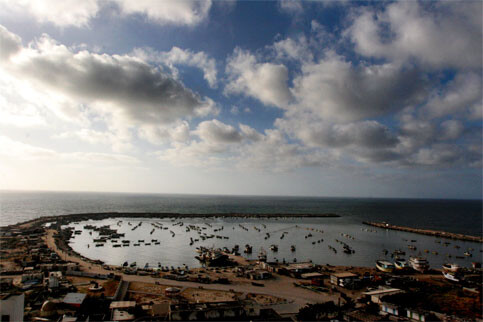The Electronic Intifada 6 May 2008

Dark clouds above Gaza. (Mohammed Omer/IPS)
GAZA CITY, 6 May (IPS) - It’s been strangely quiet for some time at the port in Gaza. No clanging of hooks, no sounds of creaking cranes or of thumping of nets upon decks. Boat engines, normally puttering and spewing exhaust, lie entombed under covers.
Of the 40,000 fishermen and others who make a living from the catch, only about 700 are still busy, according to the Fishing Syndicate in Gaza. The boats need oil, and Israel will not let the fishermen have it.
“Gaza’s 3,000 fishermen need about 40,000 liters of fuel and 40,000 liters of natural gas a day to operate for this season from March until the end of May,” says Nizar Ayash, director of the Fishing Syndicate. Now they get almost nothing.
Jamal al-Assi, 37, attempts to look busy around his idle boat. “My boat feeds 11 families,” he says. “What are we going to do? There is no hope when there is no fuel. We can’t work.”
“I have been laid off work for nearly two months due to shortage of fuel,” says Nasser al-Amodi, 49, one of Gaza’s oldest fishermen. He began his career at age nine, working alongside his father. Later he inherited the business.
Nasser, father of five, had hoped one day to pass the business on to his children. But now, as he does his bit to maintain his gear, he is not so sure. Seventy people, including the families of his brother and crew, have lost income as a result of the blockade.
“If any of my equipment breaks down or is lost, I can’t afford to replace it, not only because it isn’t available but because the price is double what it would normally be.”
Nasser and his family live in al-Shati refugee camp, one of Gaza’s oldest and most crowded refugee camps. An experienced fisherman, Nasser has all his life taken up a profession considered by many the most dangerous in the world, and for Gaza fishermen made more so by Israeli incursions and the siege.
Israel limits Palestinian fishing to six miles from shore. “But sometimes we’re not even three miles out when the Israelis chase us away,” says Ayash.
“We fishermen are part of the people, meaning whatever happens to Gaza’s people happens to us,” he says. “But we will make our voices heard around the world until our suffering ends.”
And so fishermen suffer like the others. The scarcity of fuel has hit all sections of Gaza society. Vehicles, including ambulances, cannot run, goods cannot reach their destination, and those that do are priced out of reach.
The Palestinian Petrol Station Owners Association continues to demand fuel allotment from Israeli authorities to support the basic needs of Gaza’s 1.5 million people. Israeli authorities permit fuel primarily for the electricity generation plant.
Despite Israel’s highly publicized “withdrawal” of its illegal Gaza colonies in 2005, the Strip remains under occupation through the siege, with its airport, borders and seashore controlled by Israel. Israel controls also the airspace over Gaza, and the lifelines to its economy. All imports and exports, including food, medicine, equipment and fuel are controlled through the Nahal Oz crossing.
International and Israeli human rights organizations have been urging Israel to resume fuel deliveries into the Gaza Strip.
“The current situation is a threat to the health and well-being of the population of the Gaza Strip,” says a joint statement signed by eight UN bodies. “The work of the United Nations organizations in Gaza has been severely hampered [by the fuel shortage] affecting schools, health facilities, and food distribution.”
All rights reserved, IPS - Inter Press Service (2008). Total or partial publication, retransmission or sale forbidden.
Related Links




